Peter Drucker: My Life as a Knowledge Worker
From: Inc. Magazine, February 1997 | By: Peter F. Drucker
a somewhat revised version of this article can be found in Management, Revised Edition
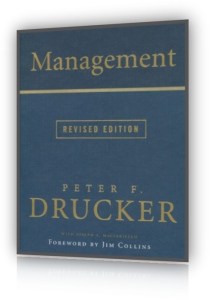 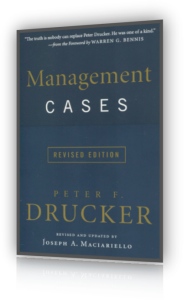
Amazon Links: Management Rev Ed and Management Cases, Revised Edition and Management Cases, Revised Edition

“Your thinking, choices, decisions are determined by
what you have seen” edb
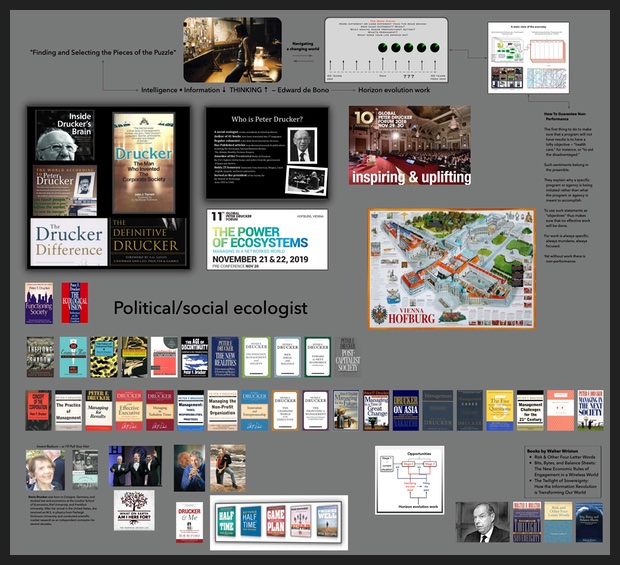
Managing Oneself
a revolution in human affairs
“I am not a ‘theoretician’; through my consulting practice I am in daily touch with the concrete opportunities and problems of a fairly large number of institutions, foremost among them businesses but also hospitals, government agencies and public-service institutions such as museums and universities.
And I am working with such institutions on several continents: North America, including Canada and Mexico; Latin America; Europe; Japan and South East Asia.” — PFD
Drucker on professional writing, economics,
business schools, philosophy, religion,
political science, Japanese Art,
accountants, and academia

The leading management thinker describes seven personal experiences that taught him how to grow, to change, and to age—without becoming a prisoner of the past. (calendarize this)
I was not yet 18 when, having finished high school, I left my native Vienna and went to Hamburg as a trainee in a cotton-export firm.
My father was not very happy.
Ours had been a family of civil servants, professors, lawyers, and physicians for a very long time.
He therefore wanted me to be a full-time university student, but I was tired of being a schoolboy and wanted to go to work.
To appease my father, but without any serious intention, I enrolled at Hamburg University in the law faculty.
In those remote days—the year was 1927—one did not have to attend classes to be a perfectly proper university student.
All one had to do to obtain a university degree was to pay a small annual fee and show up for an exam at the end of four years.
THE FIRST EXPERIENCE
Taught by Verdi
The work at the export firm was terribly boring, and I learned very little.
Work began at 7:30 in the morning and was over at 4 in the afternoon on weekdays and at noon on Saturdays.
So I had lots of free time.
Once a week I went to the opera.
On one of those evenings I went to hear an opera by the great 19th-century Italian composer, Giuseppe Verdi—the last opera he wrote, Falstaff.
It has now become one of Verdi’s most popular operas, but it was rarely performed then.
Both singers and audiences thought it too difficult.
I was totally overwhelmed by it.
Although I had heard a great many operas, I had never heard anything like that.
I have never forgotten the impression that evening made on me.
When I made a study, I found that this opera, with its gaiety, its zest for life, and its incredible vitality, was written by a man of 80!
To me 80 was an incredible age.
Then I read what Verdi himself had written when he was asked why, at that age, when he was already a famous man and considered one of the foremost opera composers of his century, he had taken on the hard work of writing one more opera, and an exceedingly demanding one.
“All my life as a musician,” he wrote, “I have striven for perfection.
It has always eluded me.
I surely had an obligation to make one more try.”
I have never forgotten those words—they made an indelible impression on me.
When he was 18 Verdi was already a seasoned musician.
I had no idea what I would become, except that I knew by that time that I was unlikely to be a success exporting cotton textiles.
But I resolved that whatever my life’s work would be, Verdi’s words would be my lodestar.
I resolved that if I ever reached an advanced age, I would not give up but would keep on.
In the meantime I would strive for perfection, even though, as I well knew, it would surely always elude me.
(calendarize this)
THE SECOND EXPERIENCE
Taught by Phidias
It was at about this same time, and also in Hamburg during my stay as a trainee, that I read a story that conveyed to me what perfection means.
It is a story of the greatest sculptor of ancient Greece, Phidias.
He was commissioned around 440 b.c. to make the statues that to this day stand on the roof of the Parthenon, in Athens.
They are considered among the greatest sculptures of the Western tradition, but when Phidias submitted his bill, the city accountant of Athens refused to pay it.
“These statues,” the accountant said, “stand on the roof of the temple, and on the highest hill in Athens.
Nobody can see anything but their fronts.
Yet you have charged us for sculpting them in the round—that is, for doing their back sides, which nobody can see.”
“You are wrong,” Phidias retorted.
“The gods can see them.”
I read this, as I remember, shortly after I had listened to Falstaff, and it hit me hard.
I have not always lived up to it.
I have done many things that I hope the gods will not notice, but I have always known that one has to strive for perfection even if only the gods notice.
(calendarize this)
THE THIRD EXPERIENCE
Taught by Journalism
A few years later I moved to Frankfurt.
I worked first as a trainee in a brokerage firm.
Then, after the New York stock-market crash, in October 1929, when the brokerage firm went bankrupt, I was hired on my 20th birthday by Frankfurt’s largest newspaper as a financial and foreign-affairs writer.
I continued to be enrolled as a law student at the university because in those days one could easily transfer from one European university to any other.
I still was not interested in the law, but I remembered the lessons of Verdi and of Phidias.
A journalist has to write about many subjects, so I decided I had to know something about many subjects to be at least a competent journalist.
The newspaper I worked for came out in the afternoon.
We began work at 6 in the morning and finished by a quarter past 2 in the afternoon, when the last edition went to press.
So I began to force myself to study afternoons and evenings: international relations and international law; the history of social and legal institutions; finance; and so on.
Gradually, I developed a system.
I still adhere to it.
Every three or four years I pick a new subject.
It may be Japanese art; it may be economics.
Three years of study are by no means enough to master a subject, but they are enough to understand it.
So for more than 60 years I have kept on studying one subject at a time.
That not only has given me a substantial fund of knowledge.
It has also forced me to be open to new disciplines and new approaches and new methods—for every one of the subjects I have studied makes different assumptions and employs a different methodology.
See Books by Drucker and Peter Drucker :: Social / Political Ecologist (calendarize this)
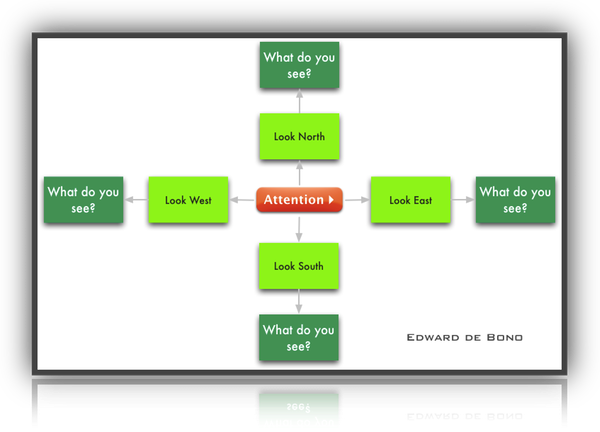
Attention
THE FOURTH EXPERIENCE
Taught by an Editor-in-Chief
The next experience to report in this story of keeping myself intellectually alive and growing is something that was taught by an editor-in-chief, one of Europe’s leading newspapermen.
The editorial staff at the newspaper consisted of very young people.
At age 22 I became one of the three assistant managing editors.
The reason was not that I was particularly good.
In fact, I never became a first-rate daily journalist.
But in those years, around 1930, the people who should have held the kind of position I had—people age 35 or so—were not available in Europe.
They had been killed in World War I.
Even highly responsible positions had to be filled by young people like me.
The editor-in-chief, then around 50, took infinite pains to train and discipline his young crew.
He discussed with each of us every week the work we had done.
Twice a year, right after New Year’s and then again before summer vacations began in June, we would spend a Saturday afternoon and all of Sunday discussing our work over the preceding six months.
The editor would always start out with the things we had done well.
Then he would proceed to the things we had tried to do well.
Next he reviewed the things where we had not tried hard enough.
And finally, he would subject us to a scathing critique of the things we had done badly or had failed to do.
The last two hours of that session would then serve as a projection of our work for the next six months: What were the things on which we should concentrate?
What were the things we should improve?
What were the things each of us needed to learn?
And a week later each of us was expected to submit to the editor-in-chief our new program of work and learning for the next six months.
I tremendously enjoyed the sessions, but I forgot them as soon as I left the paper.
Almost 10 years later, after I had come to the United States, I remembered them.
It was in the early 1940s, after I had become a senior professor, started my own consulting practice, and begun to publish major books. (See below)
Since then I have set aside two weeks every summer in which to review my work during the preceding year, beginning with the things I did well but could or should have done better, down to the things I did poorly and the things I should have done but did not do.
I decide what my priorities should be in my consulting work, in my writing, and in my teaching.
I have never once truly lived up to the plan I make each August, but it has forced me to live up to Verdi’s injunction to strive for perfection, even though “it has always eluded me” and still does.
(calendarize this)
THE FIFTH EXPERIENCE
Taught by a Senior Partner
My next learning experience came a few years after my experience on the newspaper.
From Frankfurt I moved to London in 1933, first working as a securities analyst in a large insurance company and then, a year later, moving to a small but fast-growing private bank as an economist and the executive secretary to the three senior partners.
One, the founder, was a man in his seventies; the two others were in their midthirties.
At first I worked exclusively with the two younger men, but after I had been with the firm some three months or so, the founder called me into his office and said, “I didn’t think much of you when you came here and still don’t think much of you, but you are even more stupid than I thought you would be, and much more stupid than you have any right to be.”
Since the two younger partners had been praising me to the skies each day, I was dumbfounded.
And then the old gentlemen said, “I understand you did very good securities analysis at the insurance company.
But if we had wanted you to do securities-analysis work, we would have left you where you were.
You are now the executive secretary to the partners, yet you continue to do securities analysis.
What should you be doing now, to be effective in your new job?”
I was furious, but still I realized that the old man was right.
I totally changed my behavior and my work.
Since then, when I have a new assignment, I ask myself the question, “What do I need to do, now that I have a new assignment, to be effective?”
Every time, it is something different.
Discovering what it is requires concentration on the things that are crucial to the new challenge, the new job, the new task.
(calendarize this) (See “What do I know?”)
THE SIXTH EXPERIENCE
Taught by the Jesuits and the Calvinists
Quite a few years later, around 1945, after I had moved from England to the United States in 1937, I picked for my three-year study subject early modern European history, especially the 15th and 16th centuries.
I found that two European institutions had become dominant forces in Europe: the Jesuit Order in the Catholic South and the Calvinist Church in the Protestant North.
Both were founded independently in 1536.
Both adopted the same learning discipline.
Whenever a Jesuit priest or a Calvinist pastor does anything of significance—making a key decision, for instance—he is expected to write down what results he anticipates.
Nine months later he traces back from the actual results to those anticipations.
That very soon shows him what he did well and what his strengths are.
It also shows him what he has to learn and what habits he has to change.
Finally, it shows him what he has no gift for and cannot do well.
I have followed that method for myself now for 50 years.
It brings out what one’s strengths are—and that is the most important thing an individual can know about himself or herself.
It brings out areas where improvement is needed and suggests what kind of improvement is needed.
Finally, it brings out things an individual cannot do and therefore should not even try to do.
To know one’s strengths, to know how to improve them, and to know what one cannot do—they are the keys to continuous learning.
(calendarize this)
See “For knowledge workers, How do I perform? may be an even more important question than What are my strengths?” here
THE SEVENTH EXPERIENCE
Taught by Schumpeter
One more experience, and then I am through with the story of my personal development.
At Christmas 1949, when I had just begun to teach management at New York University, my father, then 73 years old, came to visit us from California.
Right after New Year’s, on January 3, 1950, he and I went to visit an old friend of his, the famous economist Joseph Schumpeter.
My father had already retired, but Schumpeter, then 66 and world famous, was still teaching at Harvard and was very active as the president of the American Economic Association.
Keynes vs. Schumpeter ↓
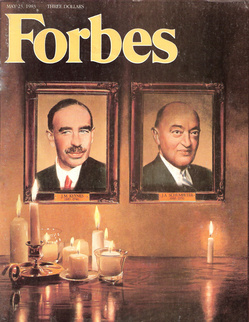
In 1902 my father was a very young civil servant in the Austrian Ministry of Finance, but he also did some teaching in economics at the university.
Thus he had come to know Schumpeter, who was then, at age 19, the most brilliant of the young students.
Two more-different people are hard to imagine: Schumpeter was flamboyant, arrogant, abrasive, and vain; my father was quiet, the soul of courtesy, and modest to the point of being self-effacing.
Still, the two became fast friends and remained fast friends.
By 1949 Schumpeter had become a very different person.
In his last year of teaching at Harvard, he was at the peak of his fame.
The two old men had a wonderful time together, reminiscing about the old days.
Suddenly, my father asked with a chuckle, “Joseph, do you still talk about what you want to be remembered for?”
Schumpeter broke out in loud laughter.
For Schumpeter was notorious for having said, when he was 30 or so and had published the first two of his great economics books, that what he really wanted to be remembered for was having been “Europe’s greatest lover of beautiful women and Europe’s greatest horseman—and perhaps also the world’s greatest economist.”
Schumpeter said, “Yes, this question is still important to me, but I now answer it differently.
I want to be remembered as having been the teacher who converted half a dozen brilliant students into first-rate economists.”
#lms Tactics
Each of us is the CEO of our liveS
#lms NYT obituaries
Finishing Well
He must have seen an amazed look on my father’s face, because he continued, “You know, Adolph, I have now reached the age where I know that being remembered for books and theories is not enough.
One does not make a difference unless it is a difference in the lives of people.”
One reason my father had gone to see Schumpeter was that it was known that the economist was very sick and would not live long.
Schumpeter died five days after we visited him.

Keynes or Schumpter?
I have never forgotten that conversation. I learned from it three things:
 First, one has to ask oneself what one wants to be remembered for. First, one has to ask oneself what one wants to be remembered for.
 Second, that should change. It should change both with one’s own maturity and with changes in the world. Second, that should change. It should change both with one’s own maturity and with changes in the world.
 Finally, one thing worth being remembered for is the difference one makes in the lives of people. Finally, one thing worth being remembered for is the difference one makes in the lives of people.
“None of my books or ideas mean anything to me in the long run.
What are theories?
Nothing.
The only thing that matters is how you touch people.
Have I given anyone insight?
That’s what I want to have done.
Insight lasts; theories don’t.
And even insight decays into small details, which is how it should be.
A few details that have meaning in one’s life are important.”
A tribute to Peter Drucker by Rick Warren
Peter liberated me

I am telling this long story for a simple reason.
All the people I know who have managed to remain effective during a long life have learned pretty much the same things I learned.
That applies to effective business executives and to scholars, to top-ranking military people and to first-rate physicians, to teachers and to artists.
Whenever I work with a person, I try to find out to what the individual attributes his or her success.
I am invariably told stories that are remarkably like mine. (calendarize this)
You are responsible for allocating your life — nobody else will do it for you
How can you calendarize this?

Peter Drucker: Social Ecologist
Adapted from Drucker on Asia: The Drucker-Nakauchi Dialogue , by Peter F. Drucker and Isao Nakauchi, copyright © 1996. Reprinted with permission of Butterworth Heinemann, a division of Reed Educational and Professional Publishing Ltd. All rights reserved. Peter F. Drucker is Clarke Professor of Social Science and Management at Claremont Graduate School, in California. He can be reached by fax at 909-626-7366.
Resources: Drucker on Asia should be available in bookstores in March. You can also order a copy directly from the publisher by calling 800-366-2665. If our autobiographical sampling whets your appetite for more, Drucker’s autobiography, Adventures of a Bystander (Transaction Publishers, 908-445-2280, 1994, $21.95), is available in paperback.
Management educator Jim Collins wrote in our December 1996 cover story on business classics that if he were forced to choose just one of Drucker’s books to recommend, he’d select The Practice of Management (HarperCollins, 800-331-3761, 1954, $16). And for still more of Drucker’s wisdom, see Inc.’s 1996 State of Small Business special issue. In “ Flashes of Genius,” editor-in-chief George Gendron interviews Drucker, who warns entrepreneurs about complacency and the common pitfalls they’re likely to encounter.
Copyright © 2008 Mansueto Ventures LLC. All rights reserved.
Inc.com, 7 World Trade Center, New York, NY 10007-2195.

|
![]()

![]()